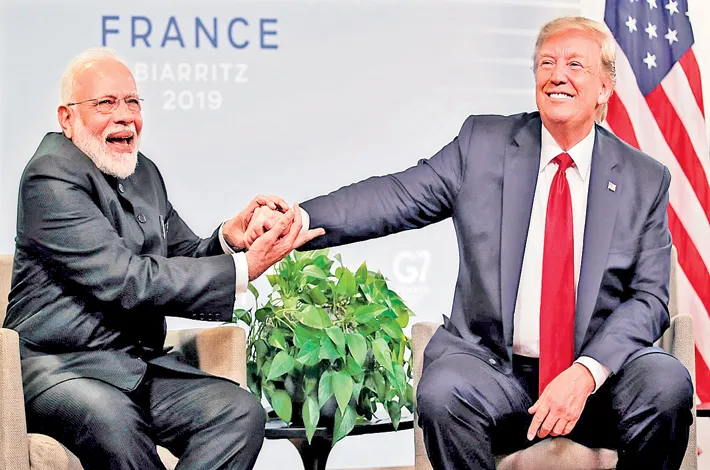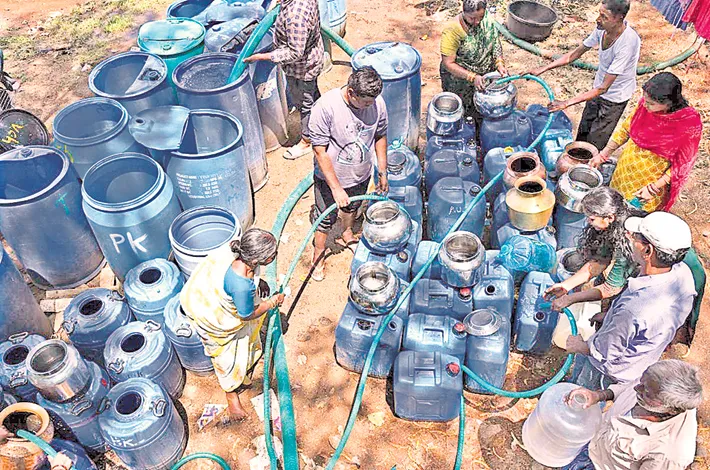Political gain at risk of economic losses
29-03-2025 12:00:00 AM

Prime Minister Modi lent an impression that he shared personal equation with US President Donald Trump, which could bring about transformational changes in the India, US bilateral relations.
But, then, the recent turn of events seemed to suggest just the opposite. It seems to suggest sudden downslide in the bilateral relations. Despite the hype over close links with Donald Trump, Prime Minister Narendra Modi was not on the Guest List of the US President-Elect for his Inaugural.
External Affairs Minister S Jaishankar rushed to the US. In damage control mode, Dr S Jaishankar appeared to be lobbying for the coveted invite for Prime Minister Modi. It did not quite work out the way it was expected to. Instead, downgrading Indian presence at the US Presidential Inaugural, External Affairs Minister S Jaishankar was extended the invite to attend the Trump Inaugural.
In his recent address to the Joint Session of the US Congress, Trump said, “India charges us 100 per cent tariffs; the system is not fair to the US, it never was. On April 2, reciprocal tariffs kick in. Whatever they tax us, we will tax them. If they use non-monetary tariffs to keep us out of their market, then we will use non-monetary barriers to keep them out of our market."
Apparently, the plan to ramp up trade to $500 billion will only benefit the US. India will be left high and dry, with higher energy costs and agricultural badly impacted. Trade Deal is more ominous. Besides, India has trade surplus with the United States. Now, there could be downward slide, with India losing its advantage.
The reciprocal tariff, set to kick in from April 2, could have an enduring adverse impact on the Indian economy. It may go as far as to hit the GDP growth by at least 0.5 to 0.6 per cent. Imagine, if the GDP growth rate is 6.5 per cent, it may come down to 5.9 per cent.
Prime Minister Modi, who rushed to the US soon after the Trump Inaugural, seemed more inclined to hurriedly clinch deals on buying gas, oil and reducing tariffs on entry of Tesla of Elon Musk into India. Once the tariffs on import of automobiles are slashed, there is a strong Indian companies like Mahindra and Mahindra, Tata and Maruti will completely be destroyed.
Already in a mode to placate US President Trump, Union Finance Minister Nirmala Sitaraman slashed import tariff on motorcycles by 50 per cent and the EVs by 85 per cent, ahead of Prime Minister Modi’s visit to the US. he import duty cut on motorcycles is a move aimed at benefiting American bike company Harley Davidson, while the import duty cut is aimed at benefiting Elon Musk of Tesla.
Similarly, the recent decision by US President Trump to allocate $ 397 million to Pakistan for F-16 fleet maintenance, raises critical questions about Prime Minister Modi’s diplomatic efficacy. India is yet to lodge a formal protest with the US Administration, over its decision to help Pakistan, which only imperils Indian security.
The US agricultural products, like maize and soybeans, can crush Indian farmers. In case tariffs on import of agricultural products were removed or slashed, it will completely destroy Indian agriculture. Indian farmers will find it hard to survive. Such a move could potentially destabilize the core of Indian economy. Trade deficit will soar, jobs will be lost and Indian industrial growth stunted for years to come.
India's economic future could be at stake, in what is perceived as political gain in cosying up to Trump Administration. Especially so, with reciprocal tariffs set to kick in from April 2. Despite the seven months’ time-frame for negotiations, given the present mood in the Modi Government, Union Commerce Minister Piyush Goel may well end up signing on the dotted line.
Reciprocal tariffs is only the proverbial tip of the iceberg. US President Trump said the US would increase military sales to India "by many billions of dollars starting this year." In fact, not only Prime Minister Modi has to buy oil from the US, but he will have to axe the indigenously-developed fifth generation aircraft Tejas, in order to buy the US manufactured F-35 warplanes, which Elon Musk, himself, rubbished it.
Besides, this comes at a time, when Russia has offered to produce its advanced SU-57 jets in India, which is potentially a more viable alternative. A role reversal seems inevitable, with the Indian economy pushed into a crisis. This is against the backdrop of Prime Minister Modi agreeing to increase imports from the US, while keeping down Indian exports.








